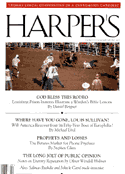Speculation as to why and how The New Republic writer and associate editor Stephen Glass was able to dupe a once well-regarded journal into printing articles based on forged notes and fictitious sources has mainly focused on the magazine’s dubious level of professionalism. (Another TNR writer, Ruth Shalit, admitted in 1995 to having plagiarized other publications several times.)
 Hindsight’s perfection made it easy for us to spot the sources that are unlikely to have made it past Mother Jones’ fact-checkers. “It never would have happened here,” we told ourselves when the story broke. Considering that Glass was assigned (but never submitted) a story for the very issue you hold in your hands, such Monday-morning editing is especially gratifying.
Hindsight’s perfection made it easy for us to spot the sources that are unlikely to have made it past Mother Jones’ fact-checkers. “It never would have happened here,” we told ourselves when the story broke. Considering that Glass was assigned (but never submitted) a story for the very issue you hold in your hands, such Monday-morning editing is especially gratifying.
But never mind the rigors of our fact-checking process. Glass’ work fails even the simple test of logic: So many of his stories are illustrated with so much vibrant “I was there” detail that it is nearly impossible to believe that even the most energetic 25-year-old could survive such an itinerary. Still, the reason Glass got away with what he did for as long as he did has little to do with the empty and grandiose facts he cited. Instead, consider the ideas he presented. Glass regularly used stereotypical characters to feed other stereotypes, a process that nurtured the magazine’s—and its readership’s—elitist sense of entitlement, and that served to reassure their cynicism.
It’s not ironic but simply galling that over the years a number of The New Republic‘s readers pointed out just how facile both Glass’ arguments and his supporting evidence appeared to be. That he might have invented and then ridiculed characters who mouthed heresy is understandable. Every elite needs straw men. His success can be attributed to the fact that the alleged sources he quoted made contemptuous critiques that would not have seemed out of place as editorial asides—especially in The New Republic, a magazine that never really restricted itself to sober, objective statements of fact to begin with.
Some people have defended Glass as being “at least a good writer of fiction.” But as fiction, Glass’ stories come across as propaganda, predictably reheating the same tired rhetoric that resides in the rest of the magazine. As journalism, his stories gave credence to the assumptions his editors and readers already wanted to believe.
—Ana Marie Cox
Glass’ stories are full of references to official-sounding organizations. We attempted to verify the existence of two of them:
The Union of Concerned Santas and Easter Bunnies (“Probable Claus,” Jan. 6, 1997), a group that “fights malls that tinker with tradition, but promotes sensitivity training for Santas,” was supposedly founded by former mall Santa and South Carolina resident Richard Claus. Searches of standard databases, such as Lexis-Nexis, and reference books, such as the Encyclopedia of Associations, turned up nothing. There is no phone listing for Richard Claus in South Carolina, and a spokeswoman for a national Santa training school in Midland, Mich., said the union was only “plausible if you’re a nut.”
A hunt for Successories Hurt Employees (“Writing on the Wall,” March 24, 1997), a group that believes the motivational posters manufactured by Successories Inc. “boost employee cynicism” also proved fruitless. Matthew Budman, author of a trade publication article about Successories that Glass appears to have based his story on, says he thinks the group must not exist. “I can’t imagine people feeling that strongly about [Successories],” he says. The CEO of Successories also said he is unfamiliar with the group.
From “Spring Breakdown” (March 31, 1997), Glass’ account of a conservative political convention at the Omni Shoreham Hotel in Washington, D.C.:
“One of the young men, an Ohioan, is wearing a green-and-white button that reads: ÔSave the Males.’ The minibar is open and empty little bottles of booze are scattered on the carpet….On Friday night, 40 of the young conservatives ditch Lott’s speech and pack a sweaty hotel room on the second floor….Again, the bathtub is filled with beer, and a thick cloud of marijuana smoke hangs above the crowd. A redheaded guy….tries unsuccessfully to program the pay-per-view to show an X-rated movie. Almost everyone in the room says they supported Phil Gramm or Pat Buchanan in last year’s election.”
In his 21/2 years at The New Republic, Glass claims, for starters, to have gone on the road in Georgia with a Baptist believer intent on converting Jews, visited the Chicago apartment of an enraptured Paul Tsongas devotee, attended the services of the First Church of George Herbert Walker Christ, posed as an expert on “biting” for a radio call-in show, observed the unveiling of a 10-by-5-foot “Newt-O-Meter” in a Capitol-area basement, and acted as a “weather watcher” for a radio station. In a piece he wrote for Harper’s Magazine (Feb. 1998), Glass recounts his 21/2-month stint as a phone psychic. 
In TNR‘s “Taxis and the Meaning of Work” (Aug. 5, 1996), Glass introduces cabbie Edward Murdock, who tells him that young blacks don’t want to drive cabs because they don’t believe “that grueling work…is better than no work.” He quotes Murdock: “If they took up driving…they could get out of the ghetto. It’s a confusion of respect and the dignity in working hard.” Another cabbie Glass rides with gets held up by a young black man: “I didn’t notice, at first, the knife our passenger was now holding to [the driver’s] neck.”
In a letter (Sept. 9, 1996) responding to “Taxis and the Meaning of Work,” a reader noted the article’s hackneyed politics. “I predicted the traditional ‘hide behind old black guys to criticize young white guys’ opener,” she wrote. “‘Great,’ I thought, ‘now it can’t end until a brother robs him.'”
In another letter to the editor (May 5, 1997), the chairman of the American Conservative Union commented that in “Spring Breakdown” Glass uses anecdotes to “prove to your readers that conservatives—and particularly young conservatives—are barely human.” Glass, he wrote, sounds “as if he must have been in the room with them counting the empties,” even though at the time there were “no minibars in any of the rooms at the Omni.”
Additional reporting by Katie Isenberg
















